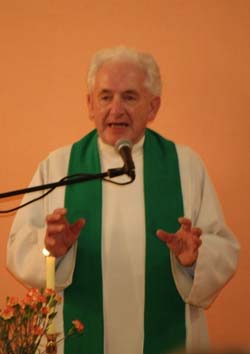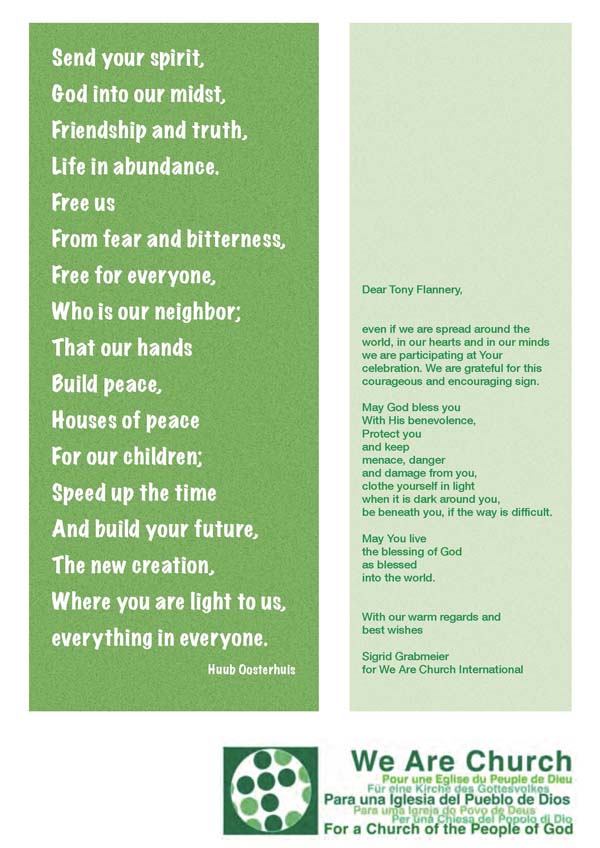by Tony Flannery C.Ss.R
 This January marks a significant milestone in my life; the eighteenth of the month is my seventieth birthday. I have wondered how best to mark it. I am not by nature a ‘party person’, so that option did not greatly appeal to me. Having spent forty years of my life ministering as a priest, I am now into my fifth year when I am forbidden by Church authorities to minister publicly. I have decided to honour my age, and my lifetime, by ignoring the Church censures, and celebrating a public Mass. Since I would not be allowed to do so either in a Catholic church or other Catholic controlled building, I have chosen, with the kind permission of the committee, to celebrate it in the local community hall in the village where I now live, which means that the Mass will take place in Killimordaly Community Centre on Sunday, January 22nd, at 2.30pm.
This January marks a significant milestone in my life; the eighteenth of the month is my seventieth birthday. I have wondered how best to mark it. I am not by nature a ‘party person’, so that option did not greatly appeal to me. Having spent forty years of my life ministering as a priest, I am now into my fifth year when I am forbidden by Church authorities to minister publicly. I have decided to honour my age, and my lifetime, by ignoring the Church censures, and celebrating a public Mass. Since I would not be allowed to do so either in a Catholic church or other Catholic controlled building, I have chosen, with the kind permission of the committee, to celebrate it in the local community hall in the village where I now live, which means that the Mass will take place in Killimordaly Community Centre on Sunday, January 22nd, at 2.30pm.
Why am I doing this? I don’t think that I am doing it just for the sake of defying Church authorities. Neither do I want it to be the beginning of an unofficial ministry on my part. I have no wish to start a new ecclesial movement. My reasons are as follows:
1. For the last five years I have been in something of a ‘limbo’ state, neither fully in or fully out of the priesthood. I have known from an early stage that there was no possibility of a resolution of the dispute between myself and the Vatican. So this public Mass will be for me a way of acknowledging the forty years of my life, and the work I did as a priest—a way of acknowledging who I am.
2. Since my dispute with the Vatican went public I have received enormous support from people all over the country, and indeed internationally. Eucharist is essentially a thanksgiving and In this Mass I am giving thanks for the good will of many people.
3. Since the beginning of my difference with the CDF, I have consistently held to one fundamental point. I don’t have any problem with the Church exercising authority. Every institution needs an authority structure. But authority must be exercised in a way that is just, and that respects the dignity of the person. In my experience, and in the experience of many others whom I have come to know in these past years, Church authority is exercised in a way that is unjust and abusive. For that reason I hope that my action will highlight once again the urgent need for change in the way the Vatican deals with people who express opinions that are considered to be at odds with official Church teaching.
4. In celebrating this public Mass I am also saying something else that I regard as important. The Mass, the Eucharist, is not in the ownership of the Congregation for the Doctrine of the Faith, or indeed of the Vatican. It belongs to the believing communities. That was where it began in the early Church, and where it finds its true meaning. My hope is, in this time of great change and upheaval in Church and society, that the believing communities begin, by whatever means possible, to regain ownership of the Eucharist. My late Redemptorist confrere, and distinguished theologian, Bernard Haring, put it this way: “The people of God have a God-given right to the Eucharist. On the basis of human law, to deprive the people of God of the Eucharist is objectively gravely sinful”
I am somewhat apprehensive about presiding at a public mass after almost 5 years in the wilderness, but to quote Macbeth, “to go back is as tedious as to go on” and I now feel the urge to take a positive step.
Directions:
For those who may wish to come to this event from various parts of the country, this is how you will find Killimordaly Community Centre:
Leave the M6 at exit 16, and take the road to KILTULLAGH.
Having reached the village of Kiltullagh – the church is clearly visible in front of you – follow the sign for Ballinasloe.
After about two hundred yards take a left off this road, and follow the signs for ATTYMON. After about a mile you will pass the hurling pitch on your right. A few hundred yards further on you will see the Community Centre, also on the right.
After the Mass refreshments will be available in the local pub, The Earl Inn, about a mile from the hall.
Somebody sent me the following, for directions on a Sat Nav or a phone. Don’t know if my copy and transfer of them will work.
Sat Nav coordinates
N53.306831,W8.621337
Smart phone directions Google Maps
https://goo.gl/maps/fy7weCczqCA2
Send a birthday message to Tony on 18 January
 An hour before the start there was standing room only! 1,000 arrived to celebrate Fr Tony Flannery's 70th birthday and his over 40 years of service to our church. Fr Willie Cummins from Ennistymon joined Fr Tony on the altar. A choir assembled specially for this occasion sang out loud to the heavens. Noírín Ní Riain enchanted us with her singing and especially her song for Tony!
An hour before the start there was standing room only! 1,000 arrived to celebrate Fr Tony Flannery's 70th birthday and his over 40 years of service to our church. Fr Willie Cummins from Ennistymon joined Fr Tony on the altar. A choir assembled specially for this occasion sang out loud to the heavens. Noírín Ní Riain enchanted us with her singing and especially her song for Tony!


 This January marks a significant milestone in my life; the eighteenth of the month is my seventieth birthday. I have wondered how best to mark it. I am not by nature a ‘party person’, so that option did not greatly appeal to me. Having spent forty years of my life ministering as a priest, I am now into my fifth year when I am forbidden by Church authorities to minister publicly. I have decided to honour my age, and my lifetime, by ignoring the Church censures, and celebrating a public Mass. Since I would not be allowed to do so either in a Catholic church or other Catholic controlled building, I have chosen, with the kind permission of the committee, to celebrate it in the local community hall in the village where I now live, which means that the Mass will take place in Killimordaly Community Centre on Sunday, January 22nd, at 2.30pm.
This January marks a significant milestone in my life; the eighteenth of the month is my seventieth birthday. I have wondered how best to mark it. I am not by nature a ‘party person’, so that option did not greatly appeal to me. Having spent forty years of my life ministering as a priest, I am now into my fifth year when I am forbidden by Church authorities to minister publicly. I have decided to honour my age, and my lifetime, by ignoring the Church censures, and celebrating a public Mass. Since I would not be allowed to do so either in a Catholic church or other Catholic controlled building, I have chosen, with the kind permission of the committee, to celebrate it in the local community hall in the village where I now live, which means that the Mass will take place in Killimordaly Community Centre on Sunday, January 22nd, at 2.30pm.